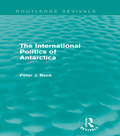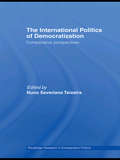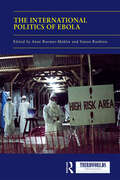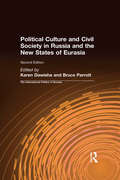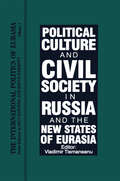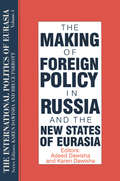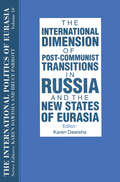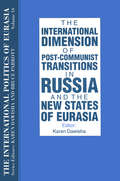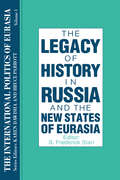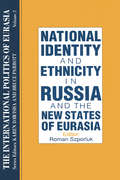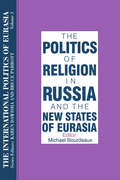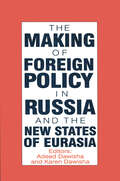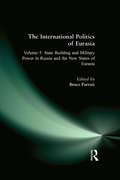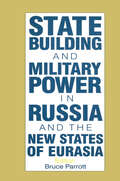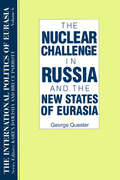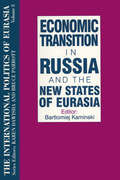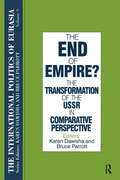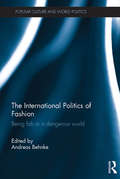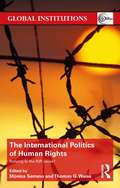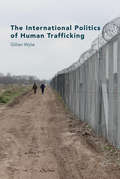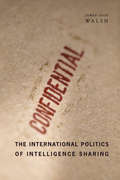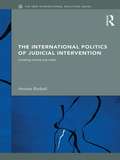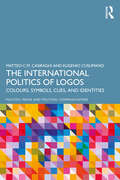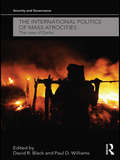- Table View
- List View
The International Politics of Antarctica (Routledge Revivals)
by Peter J. BeckFirst published in 1986, this book considers the nature of international interest in Antarctica and the positions of those involved. It looks at the significance of the historical dimension, the development of the treaty system, the management of marine and mineral resources, the role of the United Nations and the impact of such non-governmental organisations as Greenpeace International. The Antarctic implications of the Falklands War of 1982 are also discussed, as well as the underlying relationship between America and the Soviet Union during the 1980s. With a truly international scope, this reissue will be of particular relevance to students with an interest in the political, legal, economic and environmental concerns surrounding the Antarctic region, both in the present and historically.
The International Politics of Democratization: Comparative perspectives (Routledge Research in Comparative Politics #Vol. 21)
by Nuno Severiano TeixeiraThis book examines the international dimensions of democratization processes, showing the degree to which international actors, ranging from states to non-governmental players, have an influence on what were once thought of as exclusively domestic processes of political change. The contributors to the volume look at changes in foreign policy resulting from transitions to democracy in a number of countries and regions. Some of the areas covered include: Portugal and Spain in Europe in the 1970s Brazil and Argentina in Latin America from the early 1980s Eastern and Central Europe in the 1990s Various countries in the Arab World The chapters adopt a theoretical and empirical perspective: while the two introductory chapters of the book place a special emphasis on interpretation and quantitative analysis of regime change and the role of international actors in such processes, the remaining chapters examines specific case studies. The International Politics of Democratization will be of interest to students and researchers of International Relations, Politics and Democracy.
The International Politics of Ebola (ISSN)
by Simon Rushton Anne Roemer-MahlerThe outbreak of Ebola virus disease that gripped Liberia, Guinea and Sierra Leone through much of 2014 and 2015 was undoubtedly a health emergency, yet it was also a global political event. This book examines the international politics of the Ebola outbreak in all of its dimensions, critically assessing the global response, examining what the outbreak can tell us about contemporary global health governance, and examining the inequalities and injustices that were laid bare. In doing so, the book shows how some of the concepts, debates and findings from the growing field of global health research in International Relations can help both in furthering understanding of the Ebola crisis and also in improving policy responses to future infectious disease outbreaks. This book was originally published as a special edition of Third World Quarterly.
The International Politics of Eurasia: Vol 7: Political Culture and Civil Society in Russia and the New States of Eurasia
by Karen Dawisha Bruce ParrottFirst Published in 1998. Routledge is an imprint of Taylor & Francis, an Informa company.
The International Politics of Eurasia: Vol 7: Political Culture and Civil Society in Russia and the New States of Eurasia
by Karen Dawisha Bruce ParrottThis ambitious ten-volume series develops a comprehensive analysis of the evolving world role of the post-Soviet successor states. Each volume considers a different factor influencing the relationship between internal politics and international relations in Russia and in the western and southern tiers of newly independent states. The collapse of the Soviet Union and the discrediting of Marxism-Leninism as a source of political legitimacy have prompted a search for fresh principles of political organization that will shape the nature of political culture in all the post-Soviet countries. This volume analyzes the nature of the emerging political cultures and their impact on the processes of democratization in these new states.
The International Politics of Eurasia: Volume 4: The Making of Foreign Policy in Russia and the New States of Eurasia (International Politics Of Eurasia Ser. #Vol. 4)
by S. Frederick Starr Karen DawishaFirst Published in 2015. Routledge is an imprint of Taylor & Francis, an Informa company.
The International Politics of Eurasia: v. 10: The International Dimension of Post-communist Transitions in Russia and the New States of Eurasia
by S. Frederick Starr Karen DawishaThis ambitious ten-volume series develops a comprehensive analysis of the evolving world role of the post-Soviet successor states. Each volume considers a different factor influencing the relationship between internal politics and international relations in Russia and in the western and southern tiers of newly independent states. The collapse of the Soviet Union and the discrediting of Marxism-Leninism as a source of political legitimacy have prompted a search for fresh principles of political organization that will shape the nature of political culture in all the post-Soviet countries. This volume focuses on the International dimension of Post-communist transitions.
The International Politics of Eurasia: v. 10: The International Dimension of Post-communist Transitions in Russia and the New States of Eurasia (International Politics Of Eurasia Ser. #Vol 10)
by S. Frederick Starr Karen DawishaFirst Published in 2015. Routledge is an imprint of Taylor & Francis, an Informa company.
The International Politics of Eurasia: v. 1: The Influence of History
by S. Frederick Starr Karen DawishaFirst Published in 1995. This ambitious ten-volume series develops a comprehensive analysis of the evolving world role of the post-Soviet successor states. Each volume considers a different factor influencing the relationship between internal politics and international relations in Russia and in the western and southern tiers of newly independent states. The contributors were chosen not only for their recognized expertise but also to ensure a stimulating diversity of perspectives and a dynamic mix of approaches. This is Volume I and covers The Legacy of History in Russia and the New States of Eurasia.
The International Politics of Eurasia: v. 2: The Influence of National Identity
by S. Frederick Starr Karen DawishaFirst Published in 1995. Routledge is an imprint of Taylor & Francis, an Informa company.
The International Politics of Eurasia: v. 3: The Politics of Religion in Russia and the New States of Eurasia
by S. Frederick Starr Karen DawishaFirst Published in 2015. This ambitious ten-volume series develops a comprehensive analysis of the evolving world role of the post-Soviet successor states. Each volume considers a different factor influencing the relationship between internal politics and international relations in Russia and in the western and southern tiers of newly independent states. The contributors were chosen not only for their recognized expertise but also to ensure a stimulating diversity of perspectives and a dynamic mix of approaches. This is Volume3 The Politics of Religion in Russia and the New States of Eurasia.
The International Politics of Eurasia: v. 4: The Making of Foreign Policy in Russia and the New States of Eurasia
by S. Frederick Starr Karen DawishaThis ambitious ten-volume series develops a comprehensive analysis of the evolving world role of the post-Soviet successor states. Each volume considers a different factor influencing the relationship between internal politics and international relations in Russia and in the western and southern tiers of newly independent states. The collapse of the Soviet Union and the discrediting of Marxism-Leninism as a source of political legitimacy have prompted a search for fresh principles of political organization that will shape the nature of political culture in all the post-Soviet countries. This volume looks at the making of foreign policy in Russia and the new states of Eurasia.
The International Politics of Eurasia: v. 5: State Building and Military Power in Russia and the New States of Eurasia
by S. Frederick Starr Karen DawishaFirst Published in 1996. Routledge is an imprint of Taylor & Francis, an Informa company.
The International Politics of Eurasia: v. 5: State Building and Military Power in Russia and the New States of Eurasia
by S. Frederick Starr Karen DawishaThis ambitious ten-volume series develops a comprehensive analysis of the evolving world role of the post-Soviet successor states. Each volume considers a different factor influencing the relationship between internal politics and international relations in Russia and in the western and southern tiers of newly independent states. The collapse of the Soviet Union and the discrediting of Marxism-Leninism as a source of political legitimacy have prompted a search for fresh principles of political organization that will shape the nature of political culture in all the post-Soviet countries. This volume looks at military power and state building.
The International Politics of Eurasia: v. 6: The Nuclear Challenge in Russia and the New States of Eurasia
by S. Frederick Starr Karen DawishaFirst Published in 1996. Routledge is an imprint of Taylor & Francis, an Informa company.
The International Politics of Eurasia: v. 8: Economic Transition in Russia and the New States of Eurasia
by S. Frederick Starr Karen DawishaFirst Published in 1996. This ambitious ten-volume series develops a comprehensive analysis of the evolving world role of the post-Soviet successor states. Each volume considers a different factor influencing the relationship between internal politics and international relations in Russia and in the western and southern tiers of newly independent states. The contributors were chosen not only for their recognized expertise but also to ensure a stimulating diversity of perspectives and a dynamic mix of approaches. This is Volume 8 Economic Transition in Russia and the New States of Eurasia.
The International Politics of Eurasia: v. 9: The End of Empire? Comparative Perspectives on the Soviet Collapse
by S. Frederick Starr Karen DawishaFirst Published in 1997. Routledge is an imprint of Taylor & Francis, an Informa company.
The International Politics of Fashion: Being Fab in a Dangerous World (Popular Culture and World Politics)
by Andreas BehnkeThis book seeks to address and fill a puzzling omission in contemporary critical IR scholarship. Following on from the aesthetic turn in IR, critical and ‘postmodern’ IR has produced an impressive array of studies into movies, literature, music and art and the way these media produce, mediate, and represent international politics. By contrast, the proponents of the aesthetic turn have overlooked fashion as a source of knowledge about global politics. Yet stories about the political role of fashion abound in the news media. Margaret Thatcher used dress to define her political image, and more recently the fascination with Michelle Obama, Carla Bruni and other women in similar positions, and the discussions about the appropriateness of their wardrobes, regularly makes the news. In Sudan, a female writer and activist successfully challenged the government over her right to wear trousers in public and in Europe, the debate on women’s headscarves has politicised a garment item and turned it into a symbol of fundamentalism and oppression. In response, the contributors to this book investigate the politics of fashion from a variety of perspectives, addressing theoretical as well as empirical issues, establishing the critical study of fashion and its protagonists as a central contribution to the aesthetic turn in international politics. The politics of fashion go beyond these examples of the uses and abuses of textiles and fabrics for political purposes, extending into its very ‘grammar’ and vocabulary. This book will be a unique contribution to the field and will be of interest to students and scholars of international relations, critical IR theory and popular culture and world politics.
The International Politics of Human Rights: Rallying to the R2P Cause? (Global Institutions)
by Thomas G. Weiss Mónica SerranoThe responsibility to protect (R2P) is at a crossroads, the latest in a journey that is only ten years old. This book present debates on the prevention of mass atrocities to R2P’s normative prospects. The book addresses key questions as a way to inform and drive on-going conversations about R2P. Moving beyond well-rehearsed debates about the tensions and meanings around sovereignty in R2P practice, the book focuses on advancing the credibility of the preventive dimensions of R2P, whilst simultaneously examining the extent of R2P’s current value-added in state decision making—especially for the 2011 actions in Libya and Côte d’Ivoire. Questions addressed include: Did the R2P framework of the 2005 World Summit Declaration intend to mould sovereignty, and if so how? Can R2P break or revert cycles of violence? How can one determine the appropriate duration and timing of the preventive and protective phases of R2P? Who/what should be the targets of preventive action, and how does this have an impact on R2P diplomacy? Under which conditions are particular policy tools likely to be effective? Which state and regional actors are best suited to using these tools? What are the barriers to successful preventive action—how can they be overcome? What capacities need to be built (at the national, regional, and international levels) in order to operationalize R2P’s preventive agenda? Examining a wide range of countries, this work will be essential reading for students and scholars of international human rights, international organizations, peacekeeping and conflict resolution.
The International Politics of Human Trafficking
by Gillian WylieThis book explores the international politics behind the identification of human trafficking as a major global problem. Since 2000, tackling human trafficking has spawned new legal, security and political architecture. This book is grounded in the premise that the intense response to this issue is at odds with the shaky statistics and contentious definitions underpinning it. Given the disparity between architecture and evidence, Wylie asks why human trafficking has become widely understood as a threat to personal and state security in today's world. Relying on the idea of 'norm lifecycle' from constructivist International Relations, this volume traces the rise and impact of anti-trafficking activism. Global common knowledge about trafficking is now established, but at a cost. Taking issue with the predominant framing of trafficking as sexual exploitation, this book focuses on how contemporary globalization causes labour exploitation, while the concept of trafficking legitimates states' securitized responses to migration.
The International Politics of Intelligence Sharing
by Walsh James IgoeThe cross-border sharing of intelligence is fundamental to the establishment and preservation of security and stability. The American invasion of Iraq in 2003 was based in part on flawed intelligence, and current efforts to defeat al Qaeda would not be possible without an exchange of information among Britain, Pakistan, Indonesia, and the United States. While critical to national security and political campaigns, intelligence sharing can also be a minefield of manipulation and maneuvering, especially when secrecy makes independent verification of sources impossible. In The International Politics of Intelligence Sharing, James Igoe Walsh advances novel strategies for securing more reliable intelligence. His approach puts states that seek information in control of other states' intelligence efforts. According to this hierarchical framework, states regularly draw agreements in which one power directly monitors and acts on another power's information-gathering activities-a more streamlined approach that prevents the dissemination of false "secrets." In developing this strategy, Walsh draws on recent theories of international cooperation and evaluates both historical and contemporary case studies of intelligence sharing. Readers with an interest in intelligence matters cannot ignore this urgent, timely, and evidence-based book.
The International Politics of Intelligence Sharing
by James Igoe WalshThe cross-border sharing of intelligence is fundamental to the establishment and preservation of security and stability. The American invasion of Iraq in 2003 was based in part on flawed intelligence, and current efforts to defeat al Qaeda would not be possible without an exchange of information among Britain, Pakistan, Indonesia, and the United States. While critical to national security and political campaigns, intelligence sharing can also be a minefield of manipulation and maneuvering, especially when secrecy makes independent verification of sources impossible. In The International Politics of Intelligence Sharing, James Igoe Walsh advances novel strategies for securing more reliable intelligence. His approach puts states that seek information in control of other states' intelligence efforts. According to this hierarchical framework, states regularly draw agreements in which one power directly monitors and acts on another power's information-gathering activities-a more streamlined approach that prevents the dissemination of false "secrets." In developing this strategy, Walsh draws on recent theories of international cooperation and evaluates both historical and contemporary case studies of intelligence sharing. Readers with an interest in intelligence matters cannot ignore this urgent, timely, and evidence-based book.
The International Politics of Judicial Intervention: Creating a more just order (New International Relations)
by Andrea BirdsallThis volume considers the most recent demands for justice within the international system, examining how such aspirations often conflict with norms of state sovereignty and non-intervention. From an interdisciplinary approach that combines issues of International Relations with International Law, this book addresses issues neglected in both disciplines concerning the establishment a more just international order and its political implications. Through detailed examples drawn from key developments in international law, the author explores how new norms develop within international society, and how these norms generate both resistance and compliance from state actors. Case studies include: Pinochet and the House of Lords The Congo versus Belgium at the International Court of Justice The establishment of the ad hoc war crimes tribunal for the Former Yugoslavia The creation of the International Criminal Court and US opposition. The International Politics of Judicial Intervention will be of interest to students and scholars of International Relations, Human Rights and International Law.
The International Politics of Logos: Colours, Symbols, Cues, and Identities (Politics, Media and Political Communication)
by Eugenio Cusumano Matteo C.M. CasiraghiThe International Politics of Logos provides the first systematic analysis of logos and the role they play in international politics. Whilst there is growing scholarly interest in visual politics, logos have largely remained hidden in plain sight despite being the most important symbol of a variety of organizations. Visual artefacts, such as logos, play an increasingly central role in politics. Candidates running for office carefully choose the images they share on social media, political parties devise effective brands, and NGOs use visual artefacts for advocacy and advertisement. Visual artefacts are also vital for violent non-state actors, ranging from private military and security companies (PMSCs) to terrorists. This book provides a wealth of data on the logos chosen by a variety of organizations, examining how they vary between actors, across types of organizations, and over time. It offers methodological innovations to the study of logos and visual politics, highlighting the potential of combining quantitative and qualitative methodologies to study the colours, symbols, and types of logos and other visual artefacts. The book examines the role of colours as cues and the causal connection between chromatic choices and ideology, the influence of socialization and norm diffusion dynamics in the choice to showcase (or scrap) specific symbols, and the relationship between branding decisions and the structure and strategies of specific organizations. This book will appeal to students and scholars of visual politics and visual communication, as well as those researching political parties, PMSCs, and terrorist groups. It will also be of interest to political, security, and marketing professionals.
The International Politics of Mass Atrocities: The Case of Darfur (Security and Governance)
by Paul D. Williams David R. BlackThe ongoing crisis in Darfur, Sudan has stimulated a huge amount of political and academic interest across the world. The crisis has been both reflective and constitutive of key areas of contestation and change within contemporary international society. This book examines the crisis in Darfur as a case study of some of the wider debates currently taking place within International Relations theory. Using the conceptual framework developed by English School theorists, specifically their concept of international society and the related idea of "good international citizenship", this book examines a wide range of issues: foreign policy analysis, theories of norm diffusion, international organizations, peace operations, international criminal justice and war law, the causes and nature of contemporary warfare, and the international relations of Africa. Making an important contribution to the debate about the meaning and limits of international society, this book will be of interest to students and scholars international relations theory, international security, foreign policy, international organizations, human rights, African politics, genocide studies and international law.
